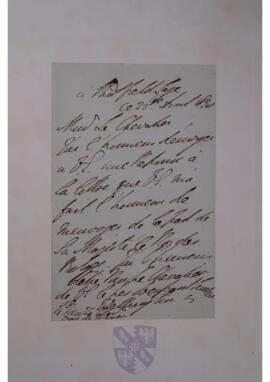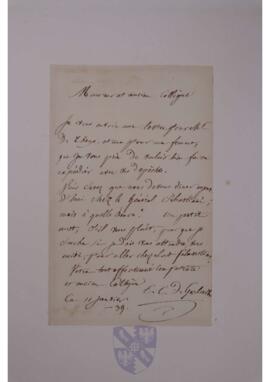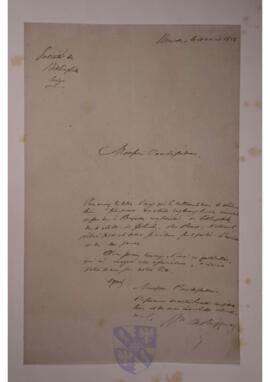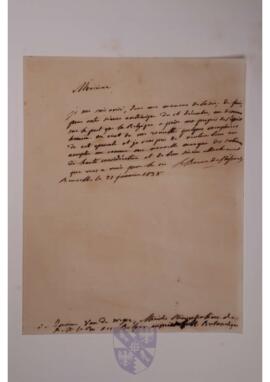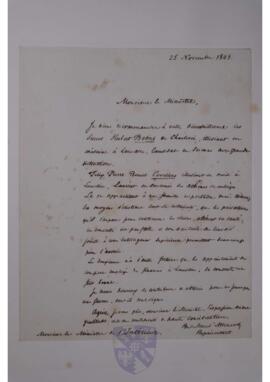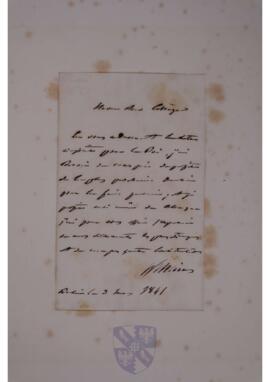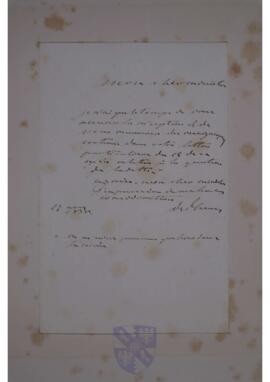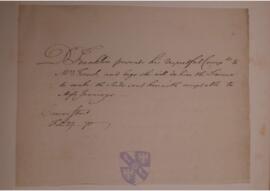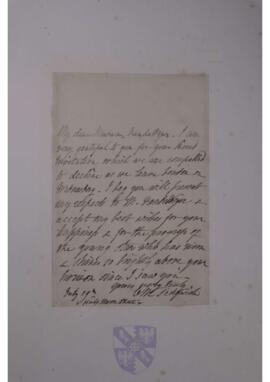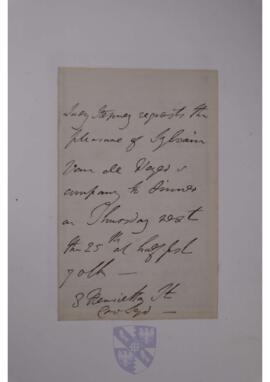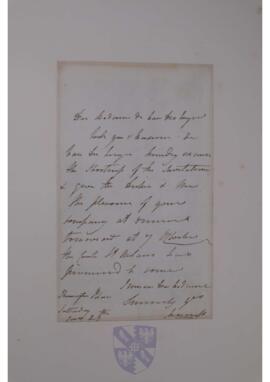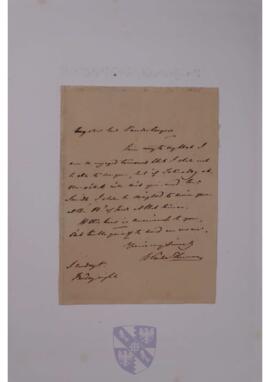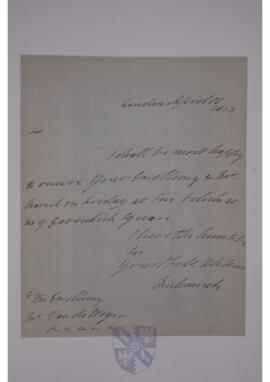Autograph letter addressed from "Woburn Abbey", to Mrs Van de Weyer, thanking her for the lace and asking her to call upon her on Monday.
Van de Weyer, Jean Sylvain (1802-1874), diplomatAutograph letter addressed from "Fordhook, near Acton" to Jean Sylvain Van de Weyer regarding the granting of a passport to Luxembourg to Bernard Henkels, who was employed in her service.
Van de Weyer, Jean Sylvain (1802-1874), diplomatAutograph letter addressed from "London", to Jean Sylvain Van de Weyer, in French.
Van de Weyer, Jean Sylvain (1802-1874), diplomatAutograph letter addressed from "London", to Jean Sylvain Van de Weyer, in French.
Van de Weyer, Jean Sylvain (1802-1874), diplomatAutograph letter in French to Jean-Sylvain Van de Weyer.
Van de Weyer, Jean Sylvain (1802-1874), diplomatAutograph letter in French, signed, to Jean-Sylvain Van de Weyer.
Van de Weyer, Jean Sylvain (1802-1874), diplomatAutograph letter in French, addressed from "Anvers", signed, to Jean-Sylvain Van de Weyer.
Van de Weyer, Jean Sylvain (1802-1874), diplomatAutograph letter in French, signed, to Jean-Sylvain Van de Weyer.
Van de Weyer, Jean Sylvain (1802-1874), diplomatAutograph letter in French, signed, to Jean-Sylvain Van de Weyer.
Van de Weyer, Jean Sylvain (1802-1874), diplomatAutograph letter in French, addressed from "Bruxelles", signed, to Jean-Sylvain Van de Weyer.
Van de Weyer, Jean Sylvain (1802-1874), diplomatAutograph letter in French, addressed from "Bruxelles", signed, to Jean-Sylvain Van de Weyer.
Van de Weyer, Jean Sylvain (1802-1874), diplomatAutograph letter in French, signed, to Jean-Sylvain Van de Weyer.
Van de Weyer, Jean Sylvain (1802-1874), diplomatAutograph letter in French, addressed from "Bruxelles", signed, to Jean-Sylvain Van de Weyer.
Van de Weyer, Jean Sylvain (1802-1874), diplomatAutograph letter in French, signed, to Jean-Sylvain Van de Weyer.
Van de Weyer, Jean Sylvain (1802-1874), diplomatAutograph letter in French, signed, to Jean-Sylvain Van de Weyer.
Van de Weyer, Jean Sylvain (1802-1874), diplomatAutograph letter addressed from "Craven Street", to Mrs [Katherine] French, presenting his compliments and begs that she will make the seeds sent herewith acceptable to Miss [Susannah] Jennings.
Van de Weyer, Jean Sylvain (1802-1874), diplomatAutograph letter addressed from "Arundel Castle", to Jean-Sylvain Van de Weyer, in which he sends his compliments and begs to refer Mr Percy to Sir William Woods at the Earl Marshall’s office, who will put him in the way of making the enquiries he wishes at the Herald’s College. The Duke has written to Sir William to expect him.
Van de Weyer, Jean Sylvain (1802-1874), diplomatAutograph letter in French, signed, to Jean-Sylvain Van de Weyer, requesting a passport for Lord Alfred Hill.
Van de Weyer, Jean Sylvain (1802-1874), diplomatAutograph letter addressed from "Buckingham Palace", to Jean-Sylvain Van de Weyer, presenting his compliments, and requesting an order for the Belgium custom house.
Van de Weyer, Jean Sylvain (1802-1874), diplomatAutograph letter, signed, to an unidentified recipient. An MS annotation at the head of the letter reads: “Mrs Norton to Capt M—"
Norton writes that the letter to Captain Chamier should be sent and the niece, who writes so prettily, should add a line to her uncle to say that brevity would be no demerit in Norton’s eyes, but a positive advantage, and therefore he only need dictate a few lines. Norton encloses the “Ship on Fire” for Captain Chamier), and plans to send “Wreck” by [?], a beautiful representation of “death on the stormy seas”. On matters of business, £3 for a poetical illustration, not exceeding a page and a half, or £5 for three pages – but Norton would prefer the shorter length, since she has already exceeded the limits of the volume. Norton trusts that he recipient will allow his book to remain in Norton’s hands until her hard work is over - she dares not open the bookcase where it is lying, for fear of being distracted from her work. Norton adds in a postscript that she is pushed for time and if she can obtain an address for Captain Chamier, she may try to send the letter to him tomorrow.
Autograph letter addressed from "Half Moon Street", signed, to Mrs Van de Weyer, informing her that she is taking her leave from London and sends her best wishes.
Van de Weyer, Jean Sylvain (1802-1874), diplomatAutograph letter, signed, to Miss Mitford, recommending the bearer of the letter (Theodore Sedgwick Fay),as a gentleman “who has made himself a name in our literature” and for whom Sedgwick has much regard.
Van de Weyer, Jean Sylvain (1802-1874), diplomatAutograph letter addressed from "8 Henrietta Street ", to Jean-Sylvain Van de Weyer, requesting his company at dinner on Thursday next.
Van de Weyer, Jean Sylvain (1802-1874), diplomatAutograph letter addressed from "Kensington Palace", signed, to Mrs Van de Weyer, inviting her and Mr Van de Weyer for dinner the next day.
Van de Weyer, Jean Sylvain (1802-1874), diplomatAutograph letter, in French, addressed from "Bruxelles", signed, to Jean-Sylvain Van de Weyer.
Van de Weyer, Jean Sylvain (1802-1874), diplomatAutograph letter addressed from "12 Lower Eaton Street", signed, to Jean-Sylvain Van de Weyer in which he writes that his brother, the Liberal politician and MP, Sir Arthur William Buller is unwell and requires swift passage through Belgium.
Van de Weyer, Jean Sylvain (1802-1874), diplomatAutograph letter in French, addressed from "Pitchford Hall", to Jean-Sylvain Van de Weyer, presenting his compliments and enclosing a letter to King Leopold.
Van de Weyer, Jean Sylvain (1802-1874), diplomatAutograph letter in French, signed, to Jean-Sylvain Van de Weyer.
Van de Weyer, Jean Sylvain (1802-1874), diplomatAutograph letter, signed, to Jean Sylvain Van de Weyer, arranging a time to meet.
Van de Weyer, Jean Sylvain (1802-1874), diplomatAutograph letter addressed from "London", signed, to Jean-Sylvain Van de Weyer, inviting him to no. 9 Cavendish Square on Friday at two o’clock.
Van de Weyer, Jean Sylvain (1802-1874), diplomat